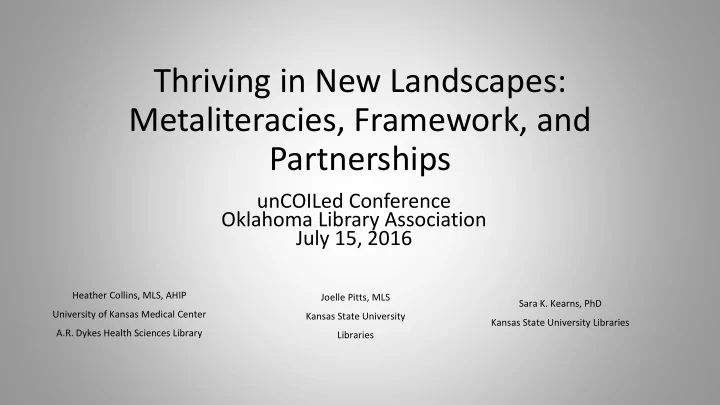

Thriving in New Landscapes: Metaliteracies, Framework, and Partnerships unCOILed Conference Oklahoma Library Association July 15, 2016 Heather Collins, MLS, AHIP Joelle Pitts, MLS Sara K. Kearns, PhD University of Kansas Medical Center Kansas State University Kansas State University Libraries A.R. Dykes Health Sciences Library Libraries
1 -2-4-All What are the most important issues and contexts facing our work today? • Name 3 • 2 minutes
1- 2 -4-All What are the most important issues and contexts facing our work today? • Work in pairs • Decide upon top 2 issues/contexts • 3 minutes
1-2- 4 -All What are the most important issues and contexts facing our work today? • 2 Pairs together (4 people) • Decide upon THE top issues/context • 3 minutes
1-2-4- All What are the most important issues and contexts facing our work today? • Each team report to the group
IL Issues/Contexts • Limited Resources • New Framework • Metaliteracies • Accreditation • Lifelong Learning • Debate of one-shots • Existential crisis of profession • Space reallocation • Digitization
WHY
The Golden Circle Why How What Sinek, 2009
Novices, Experienced Non-Experts, Experts Image by Flickr user yassan-yukky via CC BY-NC 2.0 2.0
Image by Flickr user Anna Fox via CC BY 2.0
The Framework and NLA
Getting Meta About Literacies Image by Flickr user Mark Bridge via CC BY-NC-ND 2.0
New Literacies Perspective T-shirt: James Hance: jameshance.com
New Literacies Perspective: 1. social practice 2. deictic 3. mobilize new values or ethos in how people practice literacy T-shirt: James Hance: jameshance.com
Image by Flickr user Raymond M. via CC BY 2.0
Image by Flickr user Steve Jurvetsen via CC BY 2.0
Image by Flickr user Cuddly Little Owl via CC BY-NC 2.0
New Literacies in the U environment Image by Flickr user Liberal Arts Voices via CC BY-NC-SA 2.0
In life
Joelle’s literacy Constructivism • “The human mind does not simply take in the world but makes it up in an active way” – Brandt & Perkins, 2000 Making meaning Questions that determine long-term storage: – Does this make sense? – Does this have meaning ? Image by Flickr user Allan Ajifo via CC BY 2.0
Networks Associative Semantic Social Image: Public Domain
Metaliteracies
Our Story Why
Why
Leveling Platform
Image
Our Story - The How Convergent Divergent
Our Story - The How Image
Our Story - The How Marshall McLuhan - “ The Medium is the Message ” • Metaliteracies • Liminal spaces • Frames/literacies • Problem solving • Rapid Prototyping Image
Rapid Prototyping Low fidelity • Sketches • Storyboards • Computer-based simulations • Slide shows and crude videos • Fully functional prototypes High fidelity Image: RMIT ecommerce toolbox
Our Story - The What What makes this different? • Agnosticism • True learning objects • Hosted or embeddable • Framework-based • Symbiotic Relationship http://guides.lib.k-state.edu/nla Image: Public Domain
NLA in Practice
NLA in Practice
NLA in Practice
Law of Diffusion of Innovation (Rogers, 2003) Image from Wikimedia
Challenge Accepted
References Association of College and Research Libraries. (2015, February 9). Framework for Information Literacy for Higher Education]. Retrieved July 12, 2016, from http://www.ala.org/acrl/standards/ilframework Bereiter, C. and Scardamalia, M. (1993). Surpassing ourselves: An inquiry into the nature and implications of expertise. Peru, Ill.: Open Court Publishing Company. Brandt, R. S. & Perkins, D. N. (2000). The evolving science of learning. In R. S. Brandt (ed.), Education in a New Era (pp. 159-183). Alexandria, VA: Association for Supervision and Curriculum Development. Coiro, J., Knobel, M., Lankshear, C., & Leu, D. J. (Eds.). (2008). Handbook of research on new literacies. New York: Lawrence Erlbaum Associates, Taylor & Francis Group Evidence-Based Medicine Working Group. (1992). Evidence-based medicine. A new approach to teaching the practice of medicine. JAMA , 268 (17), 2420 – 2425. Gee, J. P. (1990). Social linguistics and literacies: Ideology in discourses. London England; New York: Falmer Press. Gee, J. P. (2012). Social linguistics and literacies: Ideology in discourses (4th ed.). Abingdon, Oxon; New York: Routledge.
References, cont. Lankshear, C., & Knobel, M. (2007). Sampling "the new" in new literacies. In M. Knobel, & C. Lankshear (Eds.), New literacies sampler (pp. 1-24). New York: Peter Lang. Leu, D. J., Kinzer, C. K., Coiro, J. L., & Cammack, D. W. (2004). Toward a theory of new literacies emerging from the internet and other information and communication technologies. Theoretical Models and Processes of Reading, 5, 1570-1613. Mackey, Thomas P., & Trudi E. Jacobson. (2014). Metaliteracy: reinventing information literacy to empower learners. Chicago : ALA Neal-Schuman. Meyer, Jan H.F., & Ray Land. (2003). Enhancing teaching-learning environments in undergraduate courses (pdf), ETL Project, Occasional Report 4. Sackett, D. L. (1998). Evidence-based medicine. Spine , 23 (10), 1085 – 1086. Sousa, David A. (2011). How the brain learns (4th ed.). Thousand Oaks, CA: Corwin.
References, cont Street, B. V. (2003). What's "new" in new literacy studies? Critical approaches to literacy in theory and practice. Current Issues in Comparative Education, 5(2), 77-91. Retrieved from http://www.tc.edu/cice/Issues/05.02/52street.pdf Woods, N. (2016, June). The Interaction between clinical knowledge and basic science knowledge in diagnostic reasoning . Presented at the 19th Annual School of Medicine Medical Education Retreat, University of Kansas Medical Center, Kansas City, KS. Woods, N. (2016, June). The Interaction between clinical knowledge and basic science knowledge in diagnostic reasoning . Presented at the 19th Annual School of Medicine Medical Education Retreat, University of Kansas Medical Center, Kansas City, KS.
Recommend
More recommend